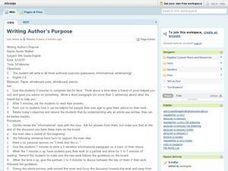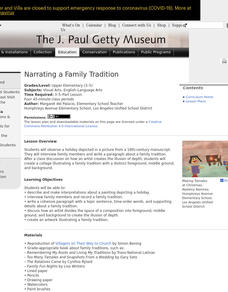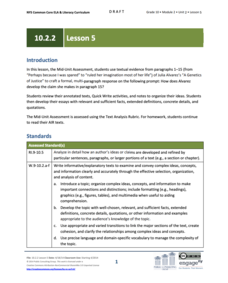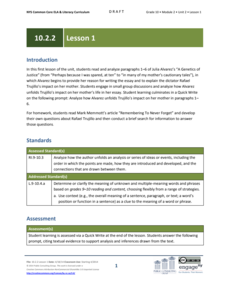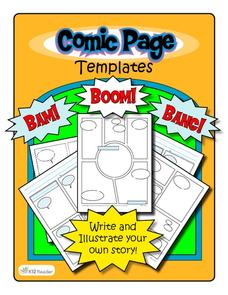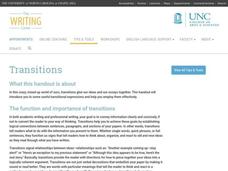Curated OER
Descriptive Writing: Parrot in the Oven
After reading a selection from Victor Martinez's Parrot in the Oven, pupils use the graphic organizer to decipher the sensory details within the descriptive paragraph. They list various details under the appropriate sense ("see," "hear,"...
Curated OER
Changing Seasons
Explore expository writing and using precise language in this descriptive paragraph writing lesson. Learners brainstorm prior knowledge about the changing seasons in Ohio. They describe seasonal items, view seasonal pictures from...
Benjamin Franklin Tercentenary
From Ben’s Pen to Our Lives
What would Ben do? Jumping off from the pseudonymous letters Ben Franklin fooled his older brother into publishing when he was still a teenager, young literary lovers dive into acting, writing, and addressing a local issue with wit and...
EngageNY
Drafting a Historical Fiction Narrative: The Wheelwright
Young writers use the four-square graphic organizer to draft their historical fiction narratives' first, second, third, and fourth paragraphs on the wheelwright. The instructional activity promotes discussion and modeling of what makes a...
Curated OER
Writing Author's Purpose
Write in all three authorial purposes (persuasive, informational, entertaining) with this lesson. Young writers consider a time when a friend of theirs helped them out and gave them advice on something. They write a short paragraph (no...
J. Paul Getty Trust
Narrating a Family Tradition
After examining a piece of art, scholars discuss what they see, paying close attention to details and space. A read-aloud introduces the topic of family traditions. Pupils interview their family members about a tradition in preparation...
Oakland Writes
Exploring Thematic Motifs in The House on Mango Street
Explore identity and community through an expository essay based on The House on Mango Street by Sandra Cisneros. This two-week unit on writing an essay provides a brief description of each day and all of the worksheets and materials you...
EngageNY
Grade 9 ELA Module 3, Unit 3, Lesson 3
Plagiarism is the theft of intellectual property. To avoid this crime, class members learn how to create a works cited page and how to craft in-text citations. After examining a high-performance model paragraph and an example of a works...
Dream of a Nation
Writing an Analytic Essay
After researching an issue introduced in Tyson Miller's Dream of a Nation: Inspiring Ideas for a Better America, writers develop an original thesis statement and craft an analytic essay using evidence collected in their research.
EngageNY
Grade 10 ELA Module 2: Unit 2, Lesson 5
How do learners use textual evidence from a close reading to write a well-developed essay? Scholars try it by completing a mid-unit assessment based on their analysis of the first 15 paragraphs from "A Genetics of Justice" by Julia...
EngageNY
Grade 10 ELA Module 2: Unit 2, Lesson 1
Rafael Trujillo was president of the Dominican Republic in the 1930s. Pupils read and analyze the first six paragraphs of Julia Alvarez's autobiographical essay "A Genetics of Justice," in which the author describes Trujillo's impact on...
EngageNY
Grade 10 ELA Module 2: Unit 2, Lesson 2
What is a megalomaniac? Scholars discover the word's meaning as they read and analyze paragraphs seven and eight from Julia Alvarez's essay "A Genetics of Justice." They also read Mark Memmott's article "Remembering to Never Forget" and...
Curated OER
Narrative Writing vs. Explanatory Writing
The class discusses the different purposes an author has for writing. The focus of the discussion is on writing to tell a true story and writing to give information about a specific topic. There are writing purpose sorting cards embedded...
Curated OER
Transition Words in Writing
Transition words in writing are the focus of the language arts lesson presented here. In it, learners cut out the word-sort cards (embedded in the plan), and put them into four categories: time, examples, space, and summary. They find a...
Virginia Department of Education
Analyzing and Planning Persuasive Writing
Young writers work backward to analyze persuasive techniques. As a class, work through the provided persuasive letter: a plea to an imaginary city council to lift a city-wide ban on fast food restaurants and discount stores. Start by...
Scholastic
Choose Your Words Wisely (Grades 9-12)
Words, words, words. The function of words in persuasive writing is the focus of a group activity that asks members to analyze how words advertisers use are designed to influence targeted audiences.
Curated OER
Grammar - Revise Your Symbols
Explore the different symbols of grammar. Middle schoolers write two sentences using different symbols, including asterisks, apostrophes, and ellipses. They also read and answer guided questions.
Curated OER
Social Studies: Essay Outline
Here is a resource intended for a social studies class, but great no matter the subject. It's a complete outline for an essay. It includes space to write ideas related to the thesis, supporting details, transition sentences and words,...
Curated OER
Setting Goals: Finance
First, learners discuss the difference between short- and long-term goals, then they establish their own financial goals. They fill out a financial goal worksheet, create a long-term goal collage, and respond to a writing prompt defining...
EngageNY
Revising for Organization and Style: Exciting Endings
Young writers compose a gripping ending to their historical fiction narratives. Following the previous lesson plan, where learners wrote a bold beginning, class members examine exciting endings from a literary text. They then draft their...
K12 Reader
Comic Page Templates
Looking for a set of comic strip templates? Use a resource with five comic templates complete with writing frames and text bubbles. Not only is it a great tool to have on hand in the classroom, but especially when working on narrative...
University of North Carolina
Transitions
Ideas don't naturally flow from one to another. They need transitions to help them connect. Part of a larger Writing the Paper series, the resource introduces writers to the concept of using transitions in their writing. Topics covered...
University of North Carolina
Evidence
You can claim that soda rots people's teeth or that dinosaurs were actually birds, but your claim will not stand up if it is not backed by evidence. A handout from UNC Writing Center, the seventh in the Writing the Paper series of 24,...
Curated OER
Figurative Language: Part Two
Help your young writers make their writing more descriptive and exciting in this figurative language lesson. Middle schoolers review their figurative language examples from Part One (linked to this lesson), and then write a paragraph for...
Other popular searches
- Paragraph Writing
- Five Paragraph Essay Writing
- 5 Paragraph Essay Writing
- Persuasive Paragraph Writing
- Example Paragraph Writing
- Hamburger Paragraph Writing
- Esl Paragraph Writing
- Narrative Paragraph Writing
- Paragraph Writing Dialogue
- Essay Writing 5 Paragraphs
- Five Paragraph Writing
- English Paragraph Writing






